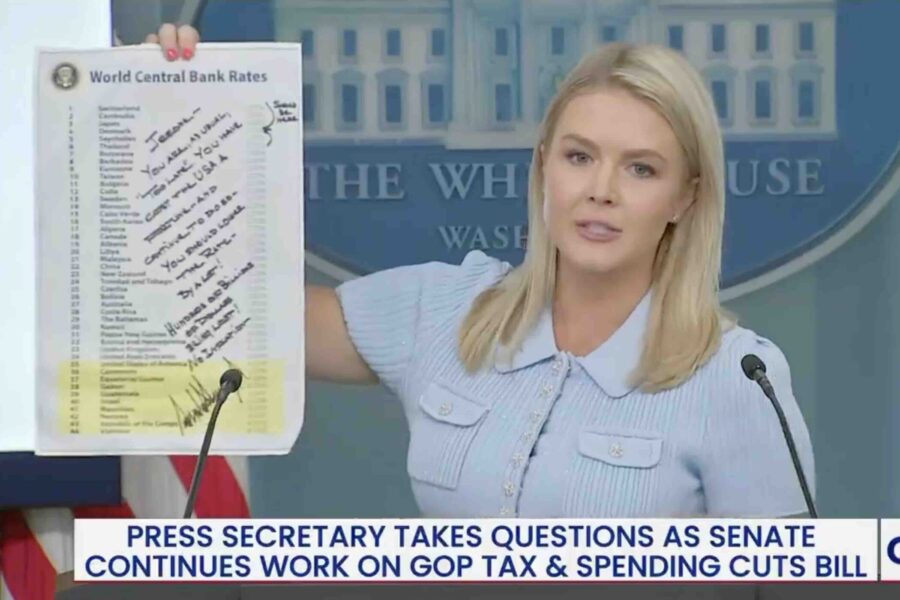Politics
WATCH: Karoline Leavitt Brings Out Trump’s Hand-Written Note During Fiery Presser

A combative Karoline Leavitt took the White House lectern on Monday, wielding a handwritten note from President Donald Trump that she said explains what’s holding back America’s economy from even greater heights.
U.S. stock markets rallied on Monday as the Dow Jones Industrial Average briefly surpassed 44,000, a level not seen since the week after President Trump’s election last November. Easing fears about fallout from a trade war, coupled with less-than-expected price hits on energy companies resulting from Middle East conflicts, has been a boon to the second Trump administration.
Add it all up and interest rates should be falling, Leavitt declared on Monday. Instead, “interest rates are still too high,” a decision she attributed to the reluctance of Federal Reserve Chair Jerome Powell to take action.
Holding up a paper chart comparing the interest rates of various countries, Trump’s White House press secretary pointed out the low rates that other countries enjoy.
At the top is Switzerland, “who is only paying a quarter for interest rates.” Cambodia, Japan, Thailand, Botswana, Bulgaria, Cuba, Cabo Verde, Libya and many others “are all paying lower interest rates than the United States,” Leavitt asserted, “which has one of the hottest and strongest economies in the world.”
She pointed to Trump’s handwritten scrawl across the page.
“‘Jerome, you are as usual ‘too late.’ You have cost the U.S. a fortune and continue to do so. You should lower the rate by a lot. Hundreds of billions of dollars are being lost, and there is no inflation,'” Leavitt read from Trump’s note to Powell.
WATCH:
Nationally, the U.S. is experiencing historically low inflation, which measured just 2.35% in May and sits below the long-term average of 3.28%. Last month’s unemployment data was the third consecutive jobs report to beat economists’ expectations.
But much like Powell, the confidence of business owners has been shaky as they express reticence about investing in the current climate. A U.S. Chamber of Commerce survey revealed rising business confidence in Q2 compared to Q1, but many respondents cited the cost of doing business — especially the cost of raw materials and labor — as impediments to future growth.
“Small businesses are cautiously navigating a complex economic landscape,” said Tom Sullivan, Senior Vice President of Small Business Policy at the U.S. Chamber of Commerce. “While they are confident in their business operations—especially at the local level—when it comes to long term planning there is some hesitation as inflation concerns linger, and new trade policies create economic uncertainty.”
To be sure, President Trump is still viewed favorably by most Americans when it comes to stewardship of the economy. A poll last month revealed that voters trust Trump and the GOP by 6 and 8-point margins to manage inflation and the economy, respectively.
Trump has used that political mandate to clash with Powell, who recently benefited from a U.S. Supreme Court decision last month stating that the Fed chairman is legally protected from being fired by the president.
“The Federal Reserve is a uniquely structured, quasi-private entity that follows in the distinct historical tradition of the First and Second Banks of the United States,” the majority of justices wrote.

